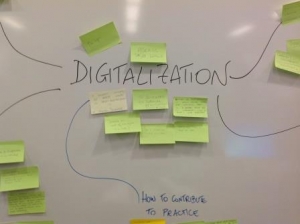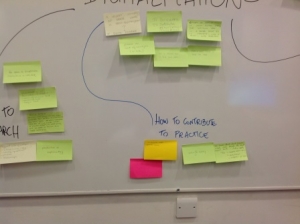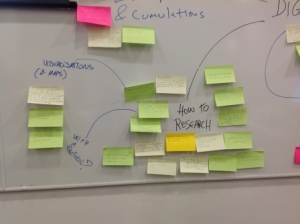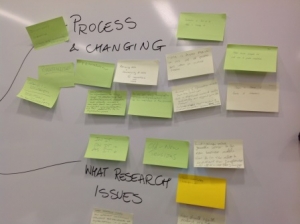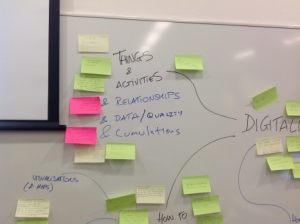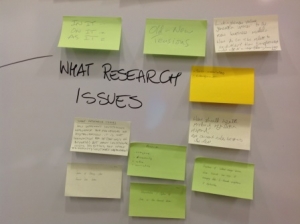Researching Digitalization Workshop: 19 May 2015
Themes for the Day:
We have all lived long enough to see digital technologies and the Internet making a significant difference to the world we live in. And this creation of difference (changing) shows little sign of reducing or stabilizing. One key part of this phenomenon is the digital becoming of things (artefacts), which has been described as digitalization. Yoo (2012)1 offers a candidate definition:
“Simply put, digitalization refers to the encoding of analog information into a digital format and the possible subsequent reconfigurations of the socio-technical context of production and consumption of [..] product and services. Digitization can happen at any of the three broad types of artifacts, physical objects, routines, representations.“
As researchers interested in Yoo’s ‘subsequent reconfigurations’ we look for new understandings of this class of phenomena, whatever the name we use, the domain we study or the unit of analysis we choose. Thus four themes for today’s workshop:
1. How to imagine or describe the kinds of changing that digital technologies bring?
We say ‘changing’ rather than ‘change’, giving away up front our bias towards studying this as a process of change rather than as a set of changed states.
Our bias also is towards the study of things (artefacts) over systems or infrastructures, so the second theme is
2. How do things (artefacts) become digital?
With plausible answers to the character or nature of digital changing including the changing of things, we can identify specific parts of our world to study, and frame suitable contextual research questions.
The third theme is then:
3. What research issues emerge from these understandings of digital changing?
Then we must render them into credible research designs drawing on suitable data, the last theme:
4. How to access or penetrate these phenomenon in vivo so as to do good research?
These 4 themes for discussion were displayed on an initial and very basic mind map:
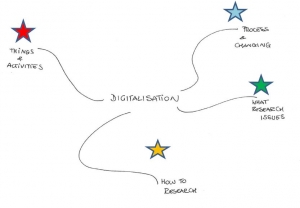 During the presentations sessions everyone was invited to mine the presentations for ideas and concepts to add to this mind map (or re-imagine it), using post it notes/marker pens. And at the end of the day, this is what the map looked like :
During the presentations sessions everyone was invited to mine the presentations for ideas and concepts to add to this mind map (or re-imagine it), using post it notes/marker pens. And at the end of the day, this is what the map looked like :
And a closer look, a focus on the detail:
Ideas for expanding the initial themes, annotated in the post-it notes, related to researching digitalization in general, but there were also some specifically aimed at the research projects presented during the day:
Digitalization
- The magic
- Reveals the/a world
- A ‘modern’ concept of order where is post-digitalization? Of digital disorder
- Is distributed, is interaction, negotiation, incentives
- Concept of representation in which digital stands for something ‘real’ in a partial sense but is inadequate – like a black & white photograph
- Creation of dynamic interaction with ‘normally’ static artefacts
- Creation of recombinable archive of ‘normally’ transient artefacts
- Process or unit of analysis (or both)
Process and changing
- Continuity – discontinuity
- Disruption + long term interests
- Installed base
- Potentialities
- Digital is always physical in its use of energy and impact on climate change
- Artefact become incomplete but could move to greater completeness
- Changes in nature and quantity of interactions
- Decoupling of information content from the medium; But is digitalized content really qualitatively non different from the medium? ; in ‘assemblage view’ : content + medium (plus practices/regulation) form the assemblage
- Retrieving data + accessibility of data , for researchers and users
- Transformation
- Do we get value through the process of digitalization or at the end/start of the process
- The digitalization of drugs changes the relationship […] doctors/consultants/hospitals and patients; we need to know more about how patients are affected by the digitalization and their contribution to the digitalization process
Things and activities (and relationships, and data/quality, and cumulations)
- By products of digitalization : with their own value, following their own journey,
- What does the absence of x says about x?
- Services and practices, not artefacts; relationships
- Things: what is data; Ana has discussed a framework to understand data as a complex set of related aspects. Each dimension can affect the understanding of the others. We need a better understanding of what is data!
- Creation of new forms of agency
- Typologies of systems for secondary use data
- Hybrids and assemblages: relationships, practices, technology/artefacts, regulations, resources
- Pull not push?
What Research Issues
- How different institutions influence the process of digitalization. It is not innovation per se (the logic of business) but many institutional logics disputing the space for defining ‘legitimate digitalization’
- Acceptance of cultural change becomes driven towards new ways of managing data & towards acceptance of digitalization
- Interpretation/capture of data in non-canonical forms
- Emergence, discontinuity, value, servitisation
- Capture of activity from transient data [?sources]
- Linking: (a) new value generating ‘spaces’ to (b) new business models. How do (a) vs (b) relate to each other ; how transformative will effects […] be
- How should health product regulation respond? Are current rules becoming obsolete
- Old-new tensions
- In IT, On IT, As IT
- Socio-materiality, entanglement
How to Research
- Be open to surprises ; research is co-created
- Understanding how value is created in : commercial /economic level; operational level; strategic level
- Multi-disciplinary
- Study what is happening and what is not – absence
- Longitudinal
- Fundamental vs incidentals
- Predictive or explanatory
- Architecture of relationships
- Different units of analysis: a thing (money, drug), industry/government, practices, relationships
- For areas lacking theory and structure, grounded theory is often recommended
- Development of automated / non-automated schemas / typologies for understanding technological processes
- Patient perspective: value to the patient; what do they see as important. How does digitalization alter their interaction: with drug, with prescriber.
- Follow the drug; it has been proposed. But after digitalization the ‘drug’ goes in many directions. There are 1st, 2nd, 3rd etc order of digitalization (as data) going and we need to follow also these data bits.
- Is a historical approach to drug discovery and development likely to be relevant to the research
- Discontinuity: focus on the process as innovation, not the tool. See the philosophy behind the process and how it has implications beyond bitcoin
- Design for ‘blow up’ and then listen to it
- Where digitalization is about enriching existing relationships (Fax telephone, methods?)
- Where digitalization creates relationships (potential for communication where historically there has been silence) (methods?) ‘overload’, ‘too much’ ‘of no value’ (articulating value)
- With a research protocol?
How to Contribute to Practice [an additional theme]
- New business models
- Research impact
- Tools
- Value for money
- We should think about business models which straddle the digital physical divide – challenge; Yoo; ‘marries form – function’; automation; internet of things
Visualization (and maps) [an additional theme]
- Creation of dynamic physical models capturing qualitative and quantitative changes across network entities
- Multi-screen video of the paths of different forms of drugs – real time comparison
- Visualization (new models) : the complexity of big data demands the use of visualization; finding new ways of visualizing complexity may be a major contribution to practice; see visualization tools for media, financial markets, etc
We will reflect further on these ideas and keep expanding and detailing the map.



